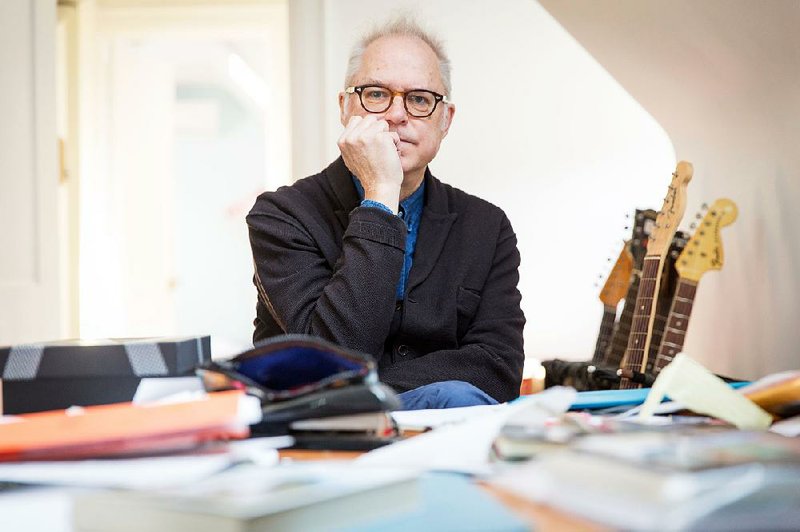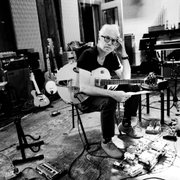I've interviewed four American presidents. Norman Mailer. Madonna. Tom Cruise. They can work out well and make great pieces, but I hardly ever get excited about doing interviews.
Yet, just over three years ago in February 2015, I sent out this tweet: "Waiting to talk to the most important American guitarist since Jimi Hendrix." It was a tease, one of those things they say people in my line of work ought to do more of these days to tantalize followers on various social media platforms. But the more I thought about it, the more I decided it was more true than hyperbolic.
Because I was talking about Bill Frisell. The occasion was a show he was scheduled to play at Little Rock's Ron Robinson Theater -- a show that wound up being canceled because of bad weather. So while I talked to Frisell and wrote the interview for our blood, dirt & angels blog (blooddirtangels.com), obviously I didn't get to see and review the show.
Now Frisell, who for years has served as a sideman for figures as disparate as free jazz composer-producer-saxophonist John Zorn and alt-folkie Vic Chesnutt, has released the remarkable jazz guitar album Music IS (OKeh Records). This is his first completely solo effort since 2000's Ghost Town. It's composed of 15 Frisell compositions; the 16 tracks have two new stripped-down versions of his venerable tune "Rambler," which in its original form was the title track of Frisell's 1984 album and featured flugelhorn and tuba. On the new album, the artist plays acoustic and electric guitars, with a little bass and ukelele in the mix. Yet the most salient feature of the recording might be Frisell's subtle and sensitive use of a looper pedal to create a sonic canvas for some of his most painterly playing.
This is a fairly straightforward album, at least for a musician as eclectic and resistant to characterization as Frisell. You can pick out elements of folk, rock, country and jazz, delivered with his trademark American tonal flavor. His playfulness weaves lightly through the project, and though the tracks are multilayered and harmonically complex, they never become dense. Above everything else, a sense of joy and tenderness permeates the project -- like we're hearing Frisell pray through his instrument.
It's this quality that marks Frisell's playing and makes him instantly receivable, even by people who don't read Downbeat or listen to Ornette Coleman. He has an uncommon gift for curating the musical DNA of a song, for discovering in the sometimes elemental changes and resolving patterns what sparks in our hearts. He plays with rare feeling.
"More and more and more [melody] is the key to everything," he said in my 2015 interview. "I find the deeper I go, the more I play it, it tells me everything I need to know. ... I studied music and I try to understand the harmony ... I try to understand the bottom of it -- but the real thing is that if I just keep playing the melody over and over it starts to show me things in another way ... It gives me something to hold onto, and then I can go off with my imagination around it. Then every song becomes its own world."
While Frisell fans won't be surprised by the quality of the new record, it's interesting to think about how quietly ubiquitous the guitarist has been for the past couple of decades. He has been an important collaborator on records by Elvis Costello, Don Byron, Marianne Faithful, David Sanborn, Suzanne Vega, Loudon Wainwright III, Vernon Reid, Van Dyke Parks, Rickie Lee Jones, Bonnie Raitt, Ron Sexsmith, John Scofield, Ginger Baker, Hal Willner, Mark Metheny and Petra Haden, among dozens -- if not hundreds -- of others.
. . .
Over the past couple of decades, he has come into his own as a composer and bandleader, establishing himself as an exceptional musical voice. Since 1983, he has recorded more than than 25 albums under his own name. Some, such as 1992's Have a Little Faith (a tour of American popular song from Aaron Copland to John Hiatt, with nods to John Philip Sousa, Charles Ives, Bob Dylan, Muddy Waters, Stephen Foster, Sonny Rollins, and Madonna), 2011's All We Are Saying -- a tribute to the songs of John Lennon -- and 2014's Guitar in the Space Age! are immediately accessible recordings that rely mostly on modern standards. Others -- like 2009's Disfarmer, a cycle of songs written to accompany the photographs of Heber Springs' Mike Disfarmer, and 2013's Silent Comedy -- highlight Frisell's compositional and improvisational gifts.
While cases could be made for any number of players including Stevie Ray Vaughan, Buddy Guy, Lee Renaldo and Jack White, Frisell might be the most important -- as opposed to influential -- American guitarist since Hendrix. Those arguments ultimately come down to taste -- what matters is that there's an unbinnable, catholic quality to Frisell's playing. He cuts across all record store rubrics, incorporating strains of all species of American music in a remarkably generous and subdued style that never sacrifices the integrity of the song on the altar of hot licks.
Frisell creates a climate with his guitar, great clouds of tone upon which he embroiders elegant figures. While he is undeniably virtuostic, there's a great depth of feeling to his work as well. He has been compared to Miles Davis for the way he sustains and nourishes a melody, even while putting it through a gymnastic workout.
Frisell is also a lovely interview. Born in Baltimore in 1951, he spent most of his youth in Colorado, first studying the clarinet with Richard Joiner of Denver Symphony Orchestra, graduating from Denver East High School, then going on to the University of Northern Colorado to study music.
Still it wasn't until late in high school that Frisell acquired a real guitar teacher -- Dale Bruning, with whom he released the 2000 duo album Reunion. After graduating from Northern Colorado, where he studied with Johnny Smith, Frisell went to Berklee College of Music in Boston.
"In fourth grade ... that's when they went around and asked if anyone wanted to play an instrument," he says. "And I just took to [the clarinet], I did well at it, I don't remember ever being super enthusiastic about it ...
"The guitar, that's what I went to on my own -- no one had to tell me to go play the guitar. I just started messing around ... the guitar was more a social thing, it was my version of being social. When I played guitar was when I was with my friend. It sort of shifted from, when I was really young, playing baseball or whatever ... somebody got a guitar. And that's where my heart ended up being. I didn't have to think about being serious about playing the guitar."
Email:
blooddirtangels.com
Style on 04/22/2018


